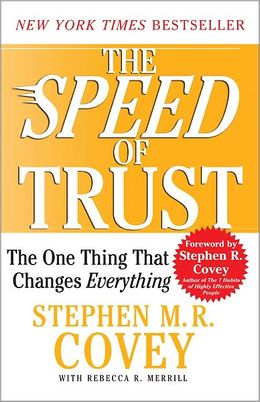Recently, I found myself in a leadership session where trust was the topic on the table. This group and I were working through Five Dysfunctions of Team and trust is the foundational element of a functional team, according to Lencioni. If you are reading this and are thinking “I don’t really work on a team” think again. I am using the word ‘team’ loosely here and teams come in all sorts of shapes and sizes. Your family is a team, you and your spouse or significant other are a team, perhaps you play on or coach a team, and maybe you serve on a committee that is working as a team --- each of those ‘groups’ needs trust. If you don’t have trust, you can forget about having a team. As a matter of fact, you can forget about having any strong, healthy relationship if trust is absent.
Think of the best team you were ever a part of, or the best relationship you have ever had with someone. Trust is at the core of those relationships, isn’t it? What great things were you able to do because you had trust?
and think
Well, in my line of work, trust can be a very squishy thing. It’s hard to talk about – hard to define – makes people feel uncomfortable – yet, if the team wants to improve the results they are getting, they have to address the topic of trust at some point.
What would get better in your life if you could improve the trust in one relationship?
and think
Until I read this book, Speed of Trust , I tended to think trust was either there with someone or not there, and once you lost it, it was very difficult, if not impossible to get back. I don’t intend to download Covey’s entire book on trust to you, but I do want to share one simple concept that has shifted or expanded my thoughts on trust. Covey says that trusting someone involves two key parts:
1) Character – their intent, motives, ethics, agenda
2) Competence – their skills, experience, knowledge
When we say “I don’t trust him”, we need to dig further. Which part of the trust is missing (or both parts in some cases)? Is it the person’s character that is making you feel queasy? Or is it the lack of competence they bring?
Let’s try examples (from my life):
Scenario #1 – I am going to be out of town for a week in the summer. The weather forecast is for HOT weather and I am worried about my hanging flower baskets being able to survive without water every day. Who can I trust to keep my flowers alive? I play the character card first. What about Rick? I’m married to him and I trust him implicitly. Oh wait, let’s check the competence card. He is really busy right now. He works long days. When he gets home at night, he won’t likely think about my poor thirsty flowers; plus, he isn’t great with flowers. He will probably overwater them or not water them enough or not water them every day and they will die. So, I might not trust Rick to care for my flowers. Go back to the character card. What about Barbara? I would trust her with anything and anyone that was important to me. AND, she is great with flowers. I’ve seen her flowers and I know that she would take good care of them. I have now found someone that has both the character and competence for me to trust them with my precious hanging flower baskets (in all actuality, I don’t trust myself to water my hanging baskets and they die by mid-July most years, so this is a pretty poor example to use).
Scenario #2 – I have a request for some client work that is too big for me to handle alone; I need to find someone to do this work with me. I quickly go down my list of options and come to Ryan (fictitious to protect the innocent), who is very skilled and has great experience. He gets a thumbs up on the competence part of trust. As I think more about working with Ryan though, I begin to get uneasy – an unsettled feeling in my stomach. What is it? I realize I don’t trust Ryan’s character. This is my client and I don’t trust that Ryan will not get in the door with me and begin to build his own relationship and take work away from me. I’ve seen it before and there always seems to be a hidden agenda with Ryan. In this case, his competence is not enough to overcome the lack of trust I have in his character.
Does this make sense to you? Since I read this book, I catch myself thinking about trust in these two categories all the time and it is really helpful. We won’t take time this week to discuss what you do when you have a lack of trust in someone’s character or competence, but I am sure your mind is going there already. To talk with someone about not trusting them is very difficult, but in my experience, it is even more difficult to talk with someone about their lack of character than their lack of competence. Competence is tied to what I do. Character is tied to who I am being. That is messy stuff! Covey’s book is full of great stuff on trust … I invite you to read it and share your thoughts on trust with us!




